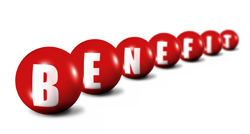The Benefits Of 401(k)s Far Outweigh The Negatives
Published Tuesday, April 13, 2010 at: 7:00 AM EDT
To paraphrase Mark Twain, the news of the death of the 401(k) plan has been greatly exaggerated. If you halted contributions to your company’s retirement plan after the stock market plummeted late in 2008, it may be time to resuscitate your account.
No one could blame you for feeling the heat. The Standard & Poor’s 500 stock index declined by a whopping 56% from its peak in October 2007 to its trough in March 2009, resulting in comparable losses for numerous 401(k) plan participants whose portfolios weren’t well diversified. About 6% of 401(k) participants had to withdraw funds from retirement accounts in 2008 to meet pressing financial needs, and almost 5% stopped contributing to their 401(k) account altogether. Still, in bad times and good, the benefits of using a 401(k) to save for retirement far outweigh the perceived negatives.
 There are risks, of course. The value of your investments will fall from time to time, and the performance of your retirement portfolio depends not only on the investment choices you make but also on market movements beyond your control. There are no guarantees you’ll make money or even escape with your principal intact. And, unlike defined-benefit pension plans, 401(k)s aren't insured by the Pension Benefit Guaranty Corporation. Furthermore, while your employer may contribute to your account, you could lose that money if you change jobs or retire before you’re "vested." But since employer contributions are essentially free money for your account, that’s hardly a negative.
There are risks, of course. The value of your investments will fall from time to time, and the performance of your retirement portfolio depends not only on the investment choices you make but also on market movements beyond your control. There are no guarantees you’ll make money or even escape with your principal intact. And, unlike defined-benefit pension plans, 401(k)s aren't insured by the Pension Benefit Guaranty Corporation. Furthermore, while your employer may contribute to your account, you could lose that money if you change jobs or retire before you’re "vested." But since employer contributions are essentially free money for your account, that’s hardly a negative.
Finally, distributions from your plan during retirement will be taxed at ordinary income rates—and if you take withdrawals early, before age 59½, you’ll probably owe a 10% penalty as well.
However, the list of 401(k) pros is much longer than the list of cons.
1. Over long periods of investing for retirement, your account is likely—though not certain—to gain value. Even when markets fall, it can be a blessing if you have a long-term time horizon because your continued regular investments let you accumulate shares at low prices, setting yourself up for big profits when the market rebounds.
 2. Your 401(k) offers several investment options, and you’re usually the one calling the shots, not your employer. Many plans include prepackaged portfolios with broadly diversified investments, and professional advice about investments is often available.
2. Your 401(k) offers several investment options, and you’re usually the one calling the shots, not your employer. Many plans include prepackaged portfolios with broadly diversified investments, and professional advice about investments is often available.
3. Contribution limits are generous. For 2017, you can put as much as $18,000 in your account, or $24,000 if you’re age 50 or over. In contrast, the annual limit for IRA contributions is only $5,500 ($6,500 if you’re age 50 or over).
4. Contributions to a traditional 401(k) may be made as pre-tax salary deferrals, which reduce your taxable income and the amount you owe the IRS. Nor are you taxed on investment earnings until you withdraw funds from your account.
5. Employers often match a portion of employee contributions with company-paid contributions based on a percentage of your salary. And once you meet the 401(k)’s vesting requirements, that money is yours to keep.
6. The impact of long-term, tax-deferred compounding can magnify annual contributions into a sizeable nest egg. For example, if you put $20,000 in your account each year and average a 7% return, your account will be worth about $1.3 million after 25 years. Note: This is just a hypothetical example and not indicative of any particular investment.
7. When you retire or change jobs, you can roll over the assets in your 401(k) tax-free to an IRA or the qualified plan of your new employer. That preserves the tax advantages of your retirement plan. For some, it will also make sense to roll over the assets to a Roth IRA.
8. Because you pay into Social Security only until you reach a specified income ceiling—$127,200 in 2017—once you’ve crossed that threshold, you could use payroll savings to increase your 401(k) contribution without reducing your paycheck.
9. Because your company’s 401(k) plan is protected by the Employee Retirement Income Security Act (ERISA), it cannot be garnished by creditors or assigned to others (except in domestic court cases involving a divorce decree or a child support order).
A 401(k) plan continues to be one of the easiest ways to save for retirement, and its advantages far outstrip its drawbacks. If you bailed out during the financial crisis, you may have already missed substantial gains during the market recovery. But getting back in now and sticking with your financial plan going forward could help you resume building for a comfortable life after work.
This article was written by a professional financial journalist for Advisor Products and is not intended as legal or investment advice.
© 2024 Advisor Products Inc. All Rights Reserved.
